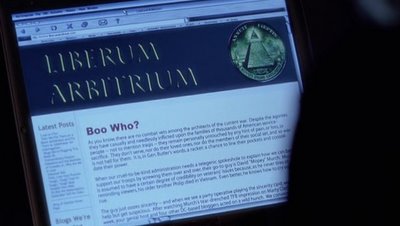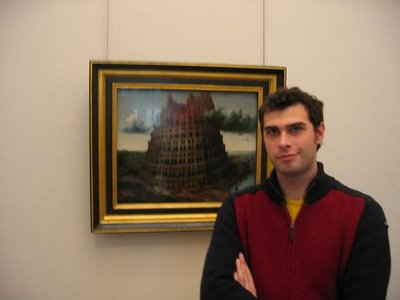blogcissism
Ok I'm at least in the top ten for a Google of 'Liberum Arbitrium'. It started because I want a better subtitle for this blog. Most notably on the main search results page there are three links involving the Polish Cultural Promotion site, two links from scholarly papers on Latin philosophy in German and the top in Dutch (of course) and one in English from Stanford. Also a blurb from Answers.com and a mention in the discography of the avant-garde electronica outfit morceaux_de_machines. Searching exclusively outside the Netherlands, paradoxically, producing a page of results entirely in Dutch. And I'm not anywhere in the exclusively INSIDE the Netherlands approach. As for English pages, I am number three :) Answers also says liberum arbitrium is mentioned in articles on predestination and accidentalism. The Google ads on this page are completely Bible-related. Stanford provides me with what I am looking for in a discussion of early Church apologist Phillip the Chancellor:
In medieval theories of action in the early part of the thirteenth century, "liberum arbitrium" is a technical term. It is a placeholder for whatever it is that enables human beings to act freely. The term originates in the work of Augustine who wrote a treatise entitled De libero arbitrio. The starting point for thirteenth-century treatises on liberum arbitrium was a definition taken from Peter Lombard's Sentences: "liberum arbitrium is a faculty of reason and will, by which good is chosen with the assistance of grace, or evil, when grace is not there to assist. And it is called "liberum" with respect to the will, which can be turned toward either [good or bad], while [it is called] "arbitrium" with respect to reason, as it has to do with that power or faculty to which the discerning between good and evil belongs."As I might have noted before I chose the name for this website because the Liberty Cap is taken in quite a few places and this was the name of a fictional website in a zombie movie from Joe Dante last year called Homecoming(see pic below). What started as an allusion became more meaningful when I read the analysis above. Even today, the roles of free will and instinct are controversial within the critical eye of cognitive theory. This can cause both the widespread perception that people are all the product of circumstances of their upbringing such that their willful criminal acts can be explained by horrible things that they have suffered through and then that genetics means that circumstances aren't as important as protein sequences. Also note that voluntas liberas is 'free will' in Latin, i.e. 'voluntary liberty', whereas liberum arbitrium implies 'liberty of arbitration' or perhaps more poetically, 'freedom of judgement'. It seems to me that one rarely chooses their desires and fetishes, but even the simplest of work requires an amazing amount of decisions and actions for success. I suppose its a matter of degrees that we have the freedom to choose actions: like how it is impossible for you to kill yourself by holding your breath. So much of what we ascribe to instinct and tradition goes unexamined for too long. creating an aura of cognitive dissonance. I believe new media will show just how free people's judgements are and can be.
Philosophers in the early thirteenth century faced the task of how to understand this definition. Although it is obvious from Lombard's formulation that both intellect and will have something to do with liberum arbitrium, their exact relationship is unclear. The phrase "liberum arbitrium" itself contributes to the uncertainty. The first part of the phrase, "liberum," is uncontroversial; it simply means "free." Difficulties arise with respect to the notion of "arbitrium." This notion has both cognitive and appetitive connotations, for it can have meanings as diverse as "judgment," "decision," "wish," or "inclination." It can also refer to a power or ability to make judgments or decisions or to the very agent who makes these judgments or decisions. Thus, the term covers a lot of territory, territory that has to do with both cognitive and appetitive capabilities. Accordingly, it is natural to connect liberum arbitrium with both intellect and will. In writing treatises on liberum arbitrium, thirteenth-century philosophers sought to sort out the connections between intellect and will on the one hand and the production and freedom of human action on the other. Some of these philosophers argued that free action results from the interaction of intellect and will, while others argued that although the intellect is an important precondition for an action's being free, the will is the true instrument that brings about a free action. Still others argued that liberum arbitrium is a separate faculty altogether although it is closely linked with and interacts with the intellect and will in the production of a free action. The practice of writing treatises on liberum arbitrium began to die off toward the later decades of the thirteenth century when philosophers started examining the topic of voluntas libera (free will) instead.
In his treatise on liberum arbitrium in Summa de bono, Philip adopts John Damascene's basic description of action. According to Damascene, an eighth-century patristic, a number of different stages come together in the production of an action. These stages include desiring, considering the various courses of action that will satisfy one's desires, deliberating over those courses of action, judging which one is to be performed, willing and choosing a particular alternative, and initiating the action. Since each of these activities are activities of the will or of the intellect, it follows that actions result from the activities of the will and the intellect. Damascene also claims that each of these stages are performed freely. Because each stage is performed freely, the resulting action is also free.
Philip modifies this position. He thinks that only the final activity of the intellect is performed freely, that is, the final judgment about what course of action to take. This is because Philip thinks that with respect to the previous activities of the intellect, activities such as identifying possible courses of action and deliberating over them, the intellect suffers from certain constraints. These constraints have to do with the structure of the world around us which in turn structures our beliefs. Beliefs play a role in our deliberations over what to do; thus the constraints placed upon beliefs in turn constrain the intellect in its activities. But according to Philip, the intellect retains some freedom for the final judgment about what to do is made freely. Thus, the intellect need not judge that a particular course of action be performed; it could have judged differently. In Philip's view, the will does not suffer from such constraints. The will is an appetite for the good so that whatever it wills, it wills a good. But a thing's being a good is merely a necessary condition, not a sufficient one. A thing's being good does not compel the will's act. Moreover, no judgment of the intellect constrains the will's choice; the will is free either to will the alternative put forth by the intellect or to reject it and will something else. It is because of this capacity of the will that Philip sees the will as the primary source of freedom in a human being. For in the final analysis, it is the will rather than the judgment of the intellect that determines the action the agent performs. Because the will wills freely, the agent performs the action freely. Thus, while both intellect and will have important roles to play in the production of a free action, freedom is primarily a function of the will.

Español | Deutsche | Français | Italiano | Português| Ch| Jp| Ko







0 Comments: